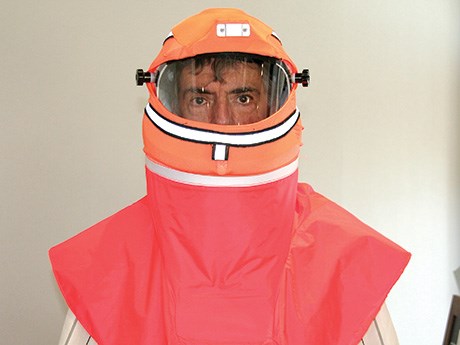Protection for one of the dirtiest jobs in the mining industry
A powered air purified respirator developed by Sudbury-based National Mine Safety for shotcrete spraying has been well received by the mining and tunneling industry since hitting the market in July.
The Moonflo branded helmet has several advantages over other helmets and face masks used for shotcrete spraying, said National Mine Safety sales manager Mike Mooney.
The helmet features a battery-powered Hepa P100 filter and is spacious enough to accommodate earmuffs, glasses and communication devices. A flip up visor allows the operator to converse with colleagues or hydrate during breaks, while a double layer bib or skirt protects exposed skin around the neck.
The battery-powered motor inside the helmet draws in air through the filter and blows it across the operator’s head. The filters last for a full shift and the rechargeable batteries, which feature an emergency exit light, hold a charge for four hours.
“Our main competition is the half mask or full-face respirator,” said Mooney. “Both require you to shave to put them on.
You can’t have a beard or a mustache and you can’t wear glasses. With the Moonflo helmet, you can have a full beard, you can wear glasses and you don’t require a fit test.
“The helmet also provides side protection so if the nozzle slips out of the hands of the operator, takes off on him and hits the side of his head, it won’t break his jaw,” added Mooney.
National Mine Safety began designing the helmet several years ago and has all the required safety certifications from the American National Standards Institute and the National Institute for Occupational Safety and Health.
The Moonflo helmet also has a removable, high-visibility spandex skin with reflective tape that protects it from getting encrusted with concrete.
“Following a job, you just remove the skin, stretch it or rub it to remove the concrete, or throw it in the wash,” said Mooney. In the absence of the skin, the only way to remove the concrete from a helmet used for shotcrete spraying would be to pound it against something, which could damage it.
Mooney, who owned Shotcrete Plus, a Sudbury-based supplier of shotcrete equipment, and partner Dennis Shannon, who trained shotcrete operators at the Northern Centre for Advanced Technology, knew from experience that shotcrete spraying is one of the dirtiest jobs in the mining industry and were determined to come up with a better solution.
Northern Mine Safety will look after sales in Canada and has struck distributorship agreements with Mesa Industries of Cincinnati and ShotCrete Montana for sales in the U.S. Additional distributors are still being sought.
“We hoped to sell 50 this year, but in just two months we sold 30, so we’re pleasantly surprised,” said Mooney.
Moonflo helmets are currently on the job in British Columbia, Tennessee, Montana, and closer to the home in Ontario and Quebec. They’re also being used in tunneling projects for subway construction in both Toronto and Washington, D.C.
“We’re concentrating on North America for now, but we’ve also had inquiries from New Zealand, Chile and France, so ultimately, we hope to go global,” said Mooney.
Feedback so far has been positive.
“For example, we gave one to DMC Mining Services to test and when I called to ask them what they thought, they told me they needed four more.”
The helmet itself is made in Toronto, the filters, batteries and motors are sourced from around the world and the final product is assembled in Sudbury.
The mining and tunneling industries are the primary markets for the Moonflo helmet, but Mooney also sees applications in grain handling and greenhouse operations.


